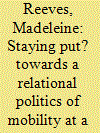| Srl | Item |
| 1 |
ID:
107536


|
|
|
| 2 |
ID:
065686


|
|
|
| 3 |
ID:
164892


|
|
|
|
|
| Summary/Abstract |
This special issue explores the forms of coexistence that emerge in what we call ‘marginal hubs’: sites that appear geographically or politically marginal, but which emerge as areas of intense and often volatile sociability, including border posts, container markets, industrial workshops, and pilgrim encampments. Such sites, which often come into being suddenly and are remote from the great urban centres, do not fit easily either within the framework of the Asian urban nor of the continent's villages and small towns. By exploring the forms of sociability that are important to everyday life in such places, we seek to widen the spectrum of settings that are recognized by scholars across the humanities and social sciences as having the potential to offer productive insights into understanding how heterogeneity is handled in Asia and beyond. This Introduction sets out the theoretical stakes of such an approach, as well as introducing the articles in this special issue.
|
|
|
|
|
|
|
|
|
|
|
|
|
|
|
|
| 4 |
ID:
090583


|
|
|
|
|
| Publication |
2009.
|
| Summary/Abstract |
This essay is concerned with the materiality of state space in a rural region of post-Soviet borderland. It examines the institutional forms and mundane practices through which a juridical boundary between Kyrgyzstan and Tajikistan is materialised; the work involved in inscribing territoriality (Gupta & Ferguson 1997, p. 40), and the social consequences of these interventions. Such processes, it argues, are more extensive, complex and disjointed than the mounting of barbed wire or the building of border posts. Territorialising the state is never merely a technical exercise; it is disparate, contentious, temporally extensive, symbolically loaded and, as Kyrgyzstan's recent past has shown, politically consequential. 1 The intense political and material investment that is entailed in producing 'territorial integrity' is particularly striking in the area of the Kyrgyzstan-Tajikistan borderland in the Isfara valley that is the focus of concern here: a region where borders have historically been of little popular relevance and where they remain poorly demarcated and weakly institutionalised.
|
|
|
|
|
|
|
|
|
|
|
|
|
|
|
|
| 5 |
ID:
107550


|
|
|
|
|
| Publication |
2011.
|
| Summary/Abstract |
Most research on labour migration from Central Asia has explored the motivations and strategies of those who move. Comparatively less attention has been given to the experience of family members who stay behind. This paper draws on ethnographic research amongst the wives of migrant husbands in a site of gendered out-migration in eastern Uzbekistan to explore diverse experiences of 'staying put'. Whilst spousal absence is experienced by some women as expanding the possibilities for social and spatial mobility, for others it can exacerbate the degree of control exerted by in-laws. Through this ethnography the author argues for a relational politics of mobility: that is, attention to the ways in which the movement of some can constrain (or compel) the mobility of others. Gendered out-migration is both embedded in, and transforms, the domestic organization of honour (nomus), in ways that are socially consequential. In Central Asia, the author argues, a richer understanding of labour migration can be gained by bringing different scales of movement into the same analytical frame and by attending ethnographically to the habitual production of place.
|
|
|
|
|
|
|
|
|
|
|
|
|
|
|
|